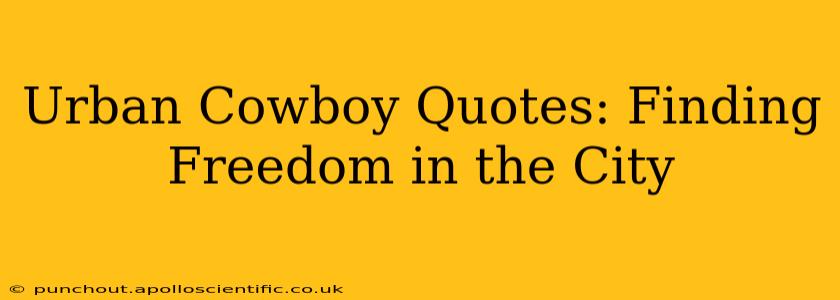The 1980 film Urban Cowboy, starring John Travolta and Debra Winger, wasn't just a box-office hit; it became a cultural phenomenon. More than just a romantic drama set in a Texas honky-tonk, it captured a specific moment in time, reflecting anxieties and aspirations about freedom, identity, and the allure of the big city. While the movie itself is packed with memorable scenes, the dialogue, particularly the potent quotes, resonates even today. This exploration delves into some of the most iconic Urban Cowboy quotes, examining their meaning and lasting impact. We’ll also look at how the film's themes of finding freedom in the city continue to be relevant in contemporary urban life.
What are some of the most famous quotes from Urban Cowboy?
This is a question many fans ask. Pinpointing the most famous is subjective, but several lines stand out for their impact and enduring recognition. These quotes often encapsulate the film's central themes: the search for belonging, the thrill of risk, and the intoxicating blend of excitement and danger found in the urban landscape. We'll analyze some of the most prominent below. Note that precise wording might vary slightly depending on the source.
What does "Let's Ride" mean in the context of Urban Cowboy?
"Let's Ride," more than just a casual invitation, serves as a recurring motif, symbolizing a leap into the unknown, a willingness to embrace the unpredictable nature of life and love. It's a call to action, a rejection of stagnancy, and an embodiment of the rebellious spirit that drives Bud and Sissy's relationship. The phrase represents their impulsive nature, their shared desire for adventure, and the inherent risks they both take in pursuing their passionate connection. It echoes the freedom and danger inherent in their lifestyle, embodying the excitement and uncertainty of life in the urban rodeo scene.
What are some of the underlying themes in Urban Cowboy?
Urban Cowboy explores several underlying themes that resonate beyond the film's setting. The most prominent include:
-
The Search for Identity: Both Bud and Sissy are searching for their place in the world. The honky-tonk becomes a space where they can explore their identities and find a sense of community.
-
The Allure and Danger of the City: The film highlights the intoxicating mix of opportunity and peril found in urban environments. The city promises freedom and excitement, but it also carries risks and uncertainties.
-
Love and Relationships: The complex relationship between Bud and Sissy serves as the emotional core of the narrative. Their passionate but volatile connection represents the highs and lows of love, highlighting the challenges of commitment and the search for lasting connection.
-
Class and Social Mobility: Urban Cowboy subtly touches on themes of social class, with the rodeo representing a space where individuals from different backgrounds can interact and compete.
Why did Urban Cowboy become so popular?
The popularity of Urban Cowboy stemmed from a number of factors, including:
-
The Soundtrack: The film’s iconic soundtrack, featuring artists like Kenny Rogers and Dolly Parton, played a significant role in its success.
-
John Travolta's Star Power: Travolta, coming off the success of Saturday Night Fever, was a major draw for audiences.
-
Cultural Relevance: The film tapped into the anxieties and aspirations of a generation grappling with economic change and shifting social norms. The depiction of youthful rebellion and the search for identity resonated deeply.
-
The Dance Craze: The movie helped popularize line dancing and created a new form of social interaction in the process.
How does Urban Cowboy reflect the anxieties and aspirations of the 1980s?
Urban Cowboy reflects the anxieties and aspirations of the 1980s through its portrayal of:
-
Economic Uncertainty: The film subtly reflects the economic anxieties of the era, showing characters struggling with financial instability.
-
Changing Social Norms: The film displays a shift in social norms, particularly regarding relationships and gender roles.
-
The Search for Meaning: The characters' relentless pursuit of pleasure and excitement can be interpreted as a reflection of a society searching for meaning in a rapidly changing world.
In conclusion, Urban Cowboy transcends its status as a simple romantic drama. Its enduring appeal lies in its exploration of universal themes—the search for identity, the allure and danger of the city, and the complexities of love—wrapped in the unique cultural context of the 1980s. The film's enduring popularity continues to resonate today, reminding us of the enduring power of cinematic storytelling and the timeless pursuit of freedom and connection in the urban landscape.

